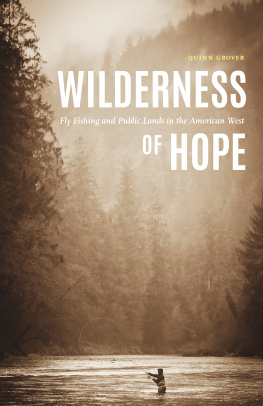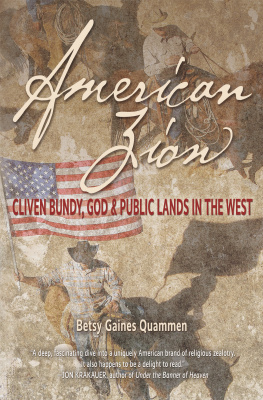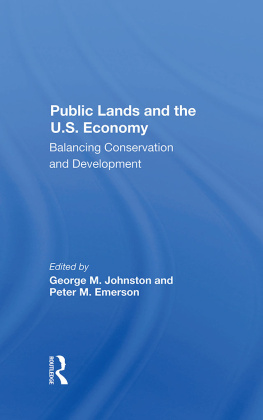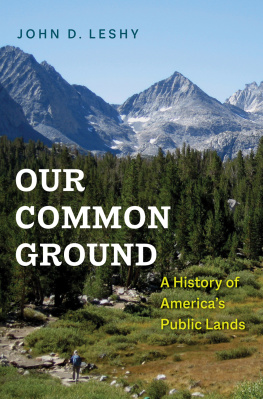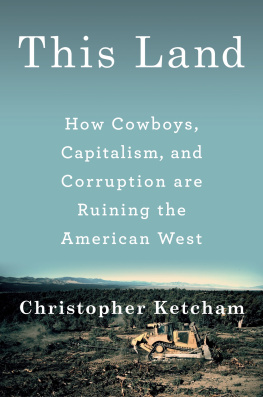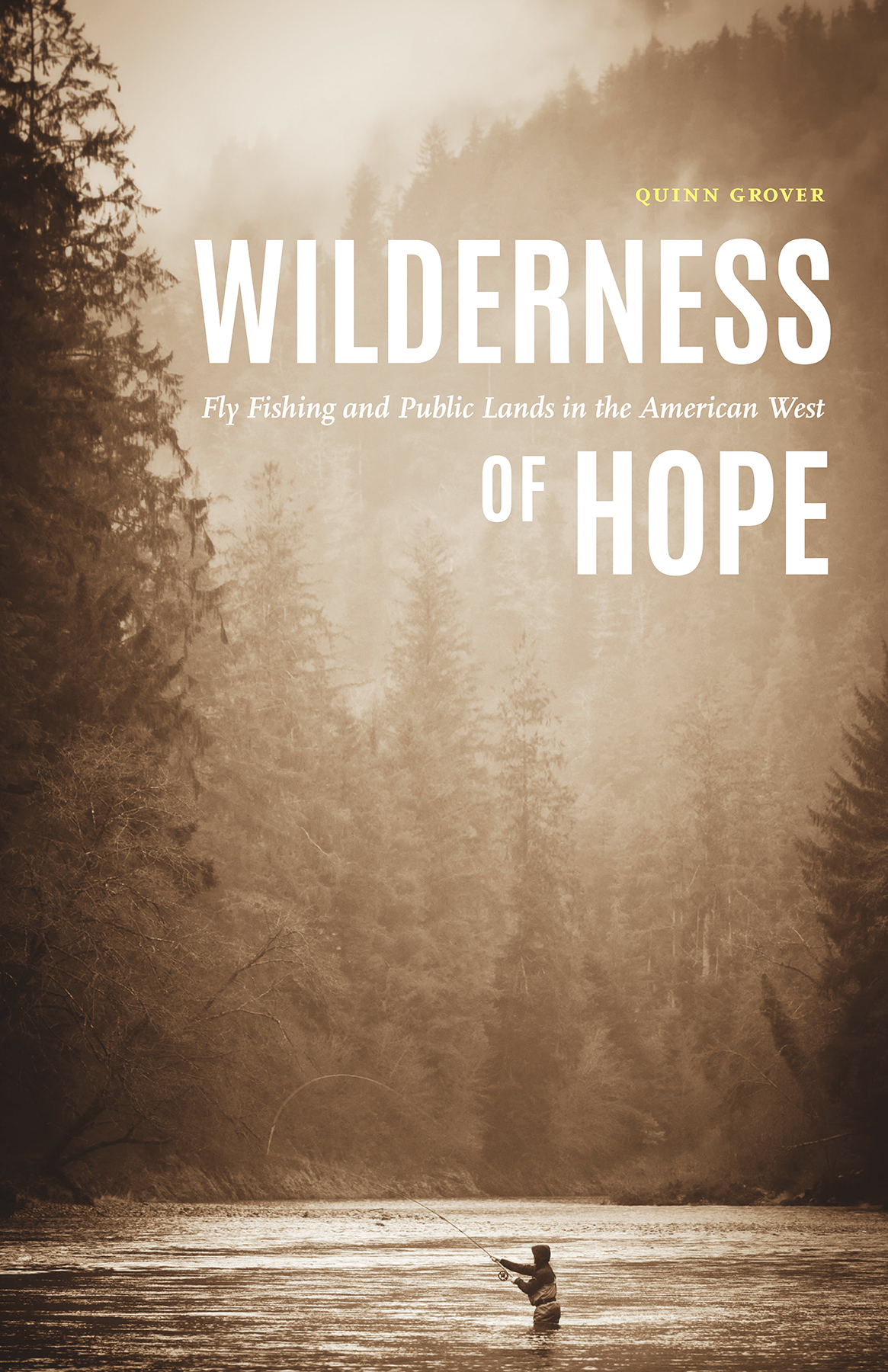
Wilderness of Hope joins a long tradition of booksincluding The River Why and A River Runs through Itwhich remind us all that, of the many possible paths toward understanding the universe, few are as reliable as fly fishing. Quinn Grover makes a strong case for passion as the key ingredient of a meaningful life, but also for knowing how the planet might make best use of us.
Brooke Williams, author of Open Midnight: Where Ancestors and Wilderness Meet
Quinn Grovers Wilderness of Hope provides a life compass for those of us who pursue wild and native trout on our public lands and waters. He preserves our capacity for wonder by weaving together the fabric of family and fishing friends, wilderness, and the importance of preserving and protecting our public lands and resources for future generations.
Craig Mathews, author of The Yellowstone Fly-Fishing Guide
On his first trip out, Quinn Grover lands a whopper! Theres a casting and reeling rhythm to his writing, long luxurious passages on natures elusive tributaries, thenzing!thrilling bites of witty insight spilling into pools of reflection. He seems to have spawned a new genre, the Ichthysroman. In Grovers own words, hes a middle-class man in love with places worth knowing. I say hes the high-class author of a book worth keeping. Im hooked!
Matthew James Babcock, author of Heterodoxologies
With meditations born from experience, Grover conveys the mystery and pull of the trout rivers that run through the American West. These essays make one want to pick up a fly rod, wade into the nearest swift water, and revel Thoreau- or Dillard-like in the wild atmospheres found there.
Braden Hepner, author of Pale Harvest

Outdoor Lives Series
Wilderness of Hope
Fly Fishing and Public Lands in the American West
Quinn Grover
University of Nebraska Press | Lincoln
2019 by Quinn Grover
Acknowledgments for the use of copyrighted material appear in , which constitutes an extension of the copyright page.
Cover designed by University of Nebraska Press; cover image iStock.com / arianstevens.
Author photo by Paige Grover.
All rights reserved
Library of Congress Cataloging-in-Publication Data
Names: Grover, Quinn, author.
Title: Wilderness of hope: fly fishing and public lands in the American west / Quinn Grover.
Description: Lincoln: University of Nebraska Press, [2019] | Series: Outdoor lives series | Includes bibliographical references.
Identifiers: LCCN 2019005274
ISBN 9781496211804 (cloth: alk. paper)
ISBN 9781496217943 (epub)
ISBN 9781496217950 (mobi)
ISBN 9781496217967 (pdf)
Subjects: LCSH : Fly fishingWest (U.S.)Anecdotes. | Wilderness areasWest (U.S.)Anecdotes.
Classification: LCC SH 456 . G 74 2019 | DDC 799.12/4dc23
LC record available at https://lccn.loc.gov/2019005274.
The publisher does not have any control over and does not assume any responsibility for author or third-party websites or their content.
For TaNece, Paige, and Ella.
And for my father, who taught me to cast a line and to love the places where lines are cast.
The rod and line,
True symbol of the foolishness of hope
William Wordsworth, The Prelude
The wild requires that we learn the terrain, nod to all the plants and animals and birds, ford the streams and cross the ridges, and tell a good story when we get back home.
Gary Snyder, The Practice of the Wild
Contents
Several chapters have been published previouslyoften in a slightly different form or under a different title. My thanks to the editors who worked with me and believed in my work enough to publish it.
An early version of Five Days in the Wilderness appeared in the now defunct Fish Cant Read.
The Glimpse and the first section of Driving Conversations (as Premeditated Optimism) appeared in the Flyfish Journal.
Funeral appeared in the Drake.
The Stump Ranch Fish appeared in Newfound.
Short Seasons appeared in Juxtaprose.
Kissing, Telling, and Invisible Trout appeared in Cirque.
Various paragraphs and sections of some chapters started out as blog posts on my retired blog In the Back Eddy or the blog Chi Wulff, run by Dry Fly Media. My thanks to those who read and commented on those pieces.
A heartfelt thanks to those who read chapters (or the whole book) and gave me encouragement and advice, especially Leslie Ovard, Jaren Watson, Trent Olsen, Riley Hebdon, and Emily Merrick. Thanks to Rob Taylor (and everyone at University of Nebraska Press) for taking a chance on me. Thanks to Margaret Mattern, Haley Mendlik, and Sarah C. Smith for exemplary editing. Thanks to all the fishing partners over the years, especially Packer, my brothers, and my dad. Thanks to my mom, who showed me what it means to be a reader. And thanks to my wife and daughters for more than I can describe.
First Fish
We simply need that wild country available to us, even if we never do more than drive to its edge and look in. For it can be a means of reassuring ourselves of our sanity as creatures, a part of the geography of hope.
Wallace Stegner, The Sound of Mountain Water
I caught my first fish using a fly rod on a Boy Scout outing. I was thirteen years old. We were camped along a small creek in central Utah, and I had insisted on taking my fly rod, even though I had yet to actually catch anything using it. The streamjust three or four feet wide in many places and bordered by bunches of willowssnaked through a meadow carpeted with the green grass of a wet summer.
I spotted the fish rising in a flat, unprotected section of river between willow bunches and I felt suddenlyalarminglyvisible. I decided to kneel before making the cast because the landscape was so wide open. I felt exposedas a fisherman, as a beginner, as an outsider in a wild place. Id like to believe that I sensed something divine in the presence of the rising of a trout, some sort of holiness, something that demanded reverence. But really, I was just scared I was going to screw up my one chance.
I hadnt really practiced casting from a kneeling position so I kind of crouched as low as I could and made my best attempt at a cast. I think my fly hit the grass behind me as it turned over. I was using a rod I had purchased at a local department store for twelve dollars, and I was a long way from the security of my backyard, where my father had taught me to cast a piece of yarn toward a bucket. I dont really remember the cast. I am sure it was poor and the fish rose out of extreme hunger or curiosity or perhaps pity.
I think the fly I was using was an Adams, but I really dont know. I am sure it had feathers because it was a dry fly. When I think about it now, I like to imagine that fly and that fish when I read Emily Dickinsons poem: Hope is the thing with feathers/ That perches in the soul (1964, 34).
I am not the first fly angler to connect that poem to the act of fly fishing and the fly itself. Ted Leeson used Dickinsons poem as a starting point for a great essay about the idea that the fly is a physical manifestation of hope in his book The Habit of Rivers. But just because the connection is not particularly original doesnt mean its any less powerful for me now, especially when I think about that day and that fish. Hope was all I had to go on. Hope and the belief that the fishs riseform (what fly anglers call the sound and sight of a fishing rising to eat a bug from the waters surface) was a part of what Dickinson called the tune without words (1964, 34), a song I desperately wished to hear then and still search for today.
Next page
